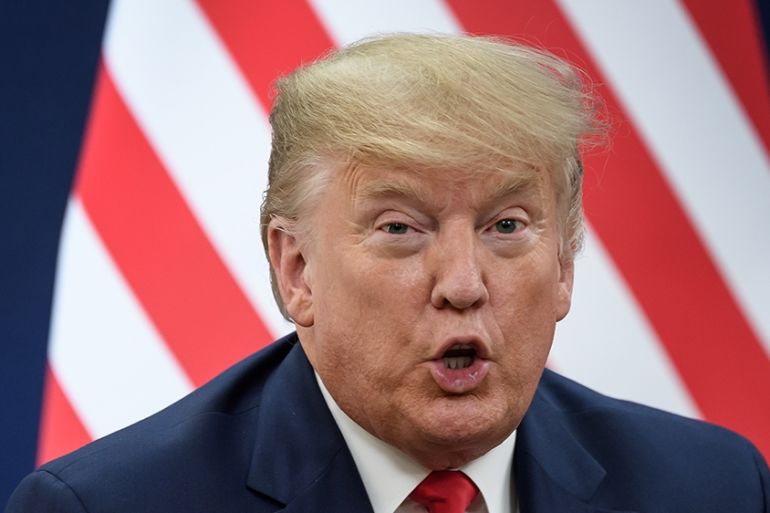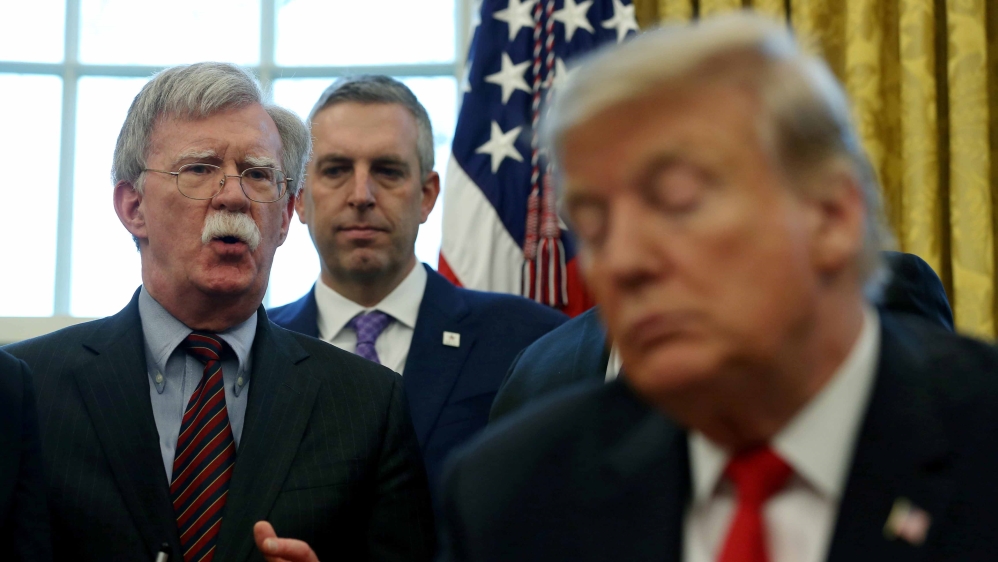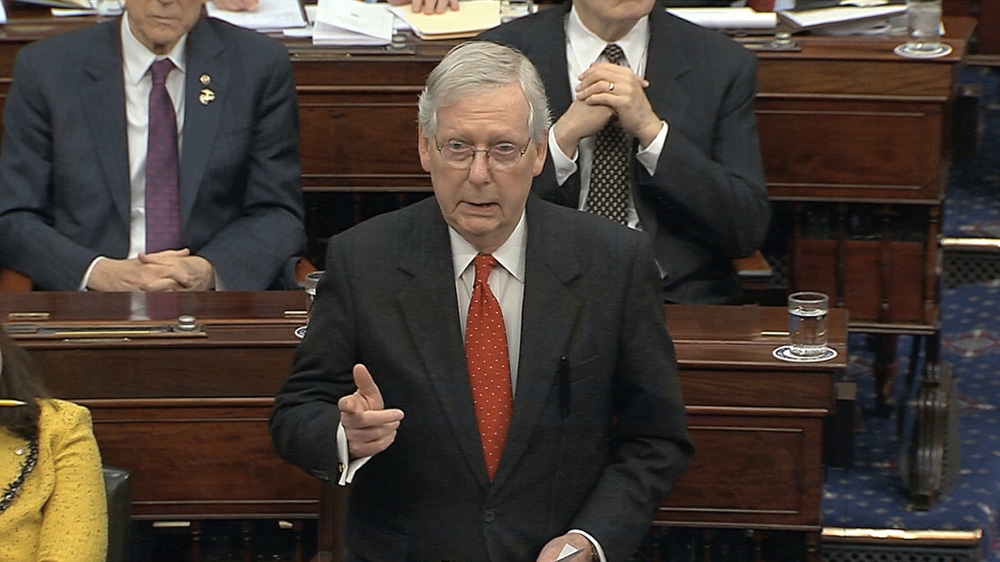What happens next in the Trump impeachment trial?
Before the question of witnesses is resolved, senators will have 16 hours to submit questions to each side.

President Donald Trump‘s defence team wrapped up its opening arguments on Tuesday as pressure mounted for the Senate to call former White House National Security Advisor John Bolton as a witness in the president’s impeachment trial in the United States.
“This should end now, as quickly as possible,” White House counsel Pat Cipollone declared, capping a defence presentation that painted Trump as a victim and took dismissive swipes at Bolton, the potential witness who has scrambled Republican hopes for a swift end to the trial.
Keep reading
list of 3 itemsWhat evidence has come out since Trump was impeached?
What happened in the Senate impeachment trial of Bill Clinton?
A day after the defence team largely brushed past Bolton, lawyer Jay Sekulow addressed the controversy head-on by dismissing his manuscript – said to contradict a key defence argument about Trump’s dealings with Ukraine – as “inadmissible”. The argument was meant to pre-empt calls from Democrats for witnesses including Bolton, who writes in a forthcoming book that Trump told him he wanted to withhold military aid from Ukraine until it helped with investigations into Democratic rival Joe Biden.
Trump was impeached by the House of Representatives on December 18 for abuse of power and obstruction of Congress.
House Democrats, whose managers gave nearly 24 hours of opening arguments last week, accuse Trump of abusing his power in office by orchestrating a pressure campaign to get Ukraine to investigate former Vice President Joe Biden, a leading Democratic political rival, as well as launch a probe into a debunked conspiracy theory about the 2016 presidential elections.
Trump refused to participate in the House impeachment investigation.
Adam Schiff, who served as the lead Democratic prosecutor in arguing the case against Trump, said the question remained as to whether the trial would be fair or unfair, with Republicans refusing so far to allow any witness testimony or new evidence.
“A fair trial involves witnesses and it involves documents,” Schiff told reporters.
With opening arguments now over, here’s a look at what to expect next:
Questions and answers
The next phase of the trial involves questions from the 100 senators, who act as jurors, to the lawyers representing Trump and the seven House Democratic managers who have served as prosecutors.
Under the rules resolution approved along party lines at the start of the trial, senators will have 16 hours over two days to ask hand-written questions of both sides.
US Supreme Court Justice John Roberts, who is presiding over the trial, will read the questions out loud. The questions will alternate between Democrats and Republicans.
A vote on witnesses?
At the conclusion of the question period, the Senate will have four hours of debate before any vote on whether to subpoena witnesses and additional documents will take place.
A vote on whether witnesses can be subpoenaed could happen as early as Friday.
Trial rules provide a two-step process on whether to subpoena witnesses and documents, with one vote on whether to consider doing so and, if approved, subsequent votes to actually call witnesses or demand documents.
Some Democrats have argued the process could allow Republicans to first vote “yes” on whether to proceed and then vote “no” on actually allowing witnesses or documents in order to avoid alienating conservative or more moderate voters.
While scoffing at Bolton’s manuscript, Trump and the Republicans have strongly resisted summoning the former White House adviser to testify in person about what he saw and heard as Trump’s top national security adviser.

Senate Republicans spent two days behind closed doors discussing ideas to satisfy those who want to hear more testimony without prolonging the proceedings – or jeopardising the president’s expected acquittal.
The ideas appear to be losing steam as quickly as they emerge.
One Republican, Senator James Lankford, was floating an idea backed by Senator Lindsey Graham to subpoena Bolton’s book manuscript so senators can see the evidence themselves – in private.
However, Chuck Schumer, the Senate’s top Democrat, called the proposal, which would keep Bolton out of public testimony: “Absurd”.
“We’re not bargaining with them. We want four witnesses and four sets of documents, then the truth will come out,” Schumer said.
Democrats want to call Bolton, former acting White House Chief of Staff Mick Mulvaney, senior adviser to the acting White House chief of staff Robert Blair and Office of Management and Budget official Michael Duffey. They need four Republicans to join them in voting for witnesses.
Some Republicans including Senator Pat Toomey want reciprocity – bring in Bolton or another Democratic witness in exchange for one from the GOP side. Some Republicans want to hear from the Bidens.

Majority Leader Mitch McConnell gathered Republican senators again late Tuesday to consider next steps. The Republican leader is encouraging senators not to become tangled in such questions that could delay things. He wants a quick finish without new witnesses or testimony.
But the Associated Press news agency reported that McConnell told Republicans he does not yet have the votes to block witnesses in Trump’s impeachment trial.
What happens if witnesses are called?
If the Senate subpoenas witnesses, they would be deposed privately before the Senate decides on public testimony.
Republicans are being warned that even if they agree to call Bolton to testify or try to access his manuscript, the White House will block him, beginning what could be a weeks-long court battle over executive privilege and national security.
That would mean a vote on whether to convict the president could be weeks away.
What happens if witnesses are not called?
If no witnesses or additional documents are subpoenaed, senators could entertain other motions or proceed to vote on each article of impeachment.
No matter the vote on the witnesses, acquittal still seems likely given that Republicans hold a 53-47 majority in the Senate and conviction would require a two-thirds majority.
If the trial lasts into the next week, it will coincide with Monday’s Iowa caucuses, which kick off the caucus and primary season for the 2020 presidential election.
Trump is also scheduled to give his State of the Union Address on February 4.